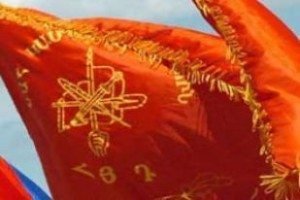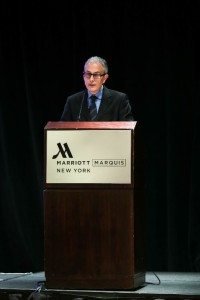The Armenian Weekly Magazine
Dec. 2015: The ARF at 125
Special for the Armenian Weekly
Anniversaries are moments to celebrate and rejoice, but also, and more importantly, times to reflect. And so with the 125th anniversary of the Armenian Revolutionary Federation (ARF), while there have been celebrations across our communities in this region and around the world, they have all been fundamentally moments of evaluation and accounting to our people. Here, as in most every corner of the Diaspora, the history of the ARF is the history of our people, and commemorating the anniversary of the ARF is both a celebration and assessment of our nation’s strength and survival.

In this part of the world, the ARF is over 120 years old. It came ashore with the earliest immigrants, and helped maintain a small part of our nation on faraway shores. Our Lowell, Mass. chapter, the oldest, was established in 1894, and our Armenian-language newspaper, Hairenik Weekly, is the longest-running Armenian newspaper. The ARF today is a presence in most every city in the U.S. with an Armenian population, and its work and struggle have been the struggle of the Armenian nation, the struggle everywhere to liberate our people and ensure their future.
The challenges of the ARF have been different throughout the years. Today, the work of the ARF is equally based in Armenia and the Diaspora. The challenges in Armenia are severe. We have worked hard to improve the economy through encouraging Diasporan and foreign investment, and have been a force against corruption; we have been a loud voice for a developing civil society and for a strong parliamentary democracy; and we have been steadfast in our focus on national security for our country surrounded by hostile nations.
In the Eastern U.S., as in most of the Diaspora, the ARF’s responsibilities have been different. Here, our efforts have focused on advancing the Hai Tahd agenda, and more broadly, for a people dispersed across the world, safeguarding our nation’s survival.
The work that the ARF pursues in the political arena has always been the assertion of our national rights. Beyond working to ensure the survival of our people, we have laid claim to justice as citizens of this world. This effort has defined entire generations, has created a political identity in all of us, and has helped invigorate our communities. We have risen to this challenge not alone, but with the support of our entire community. It has been possible to lead, because this nation trusts the ARF to pursue these goals. It is this trust that brings members of Congress to work with us for the real grassroots and shared ideals that we represent.

In Hai Tahd, we have worked hard in Congress towards a Genocide Resolution and a host of successful legislation that has helped Armenia and Artsakh economically and in matters of national security. Political awareness in our communities is sustained by the numerous local and national conferences and events that we host, like “Responsibility 2015” and “Armenians and Progressive Politics.” Engagement and activism is fostered in our youth through countless local activities, as well as formal internship programs at Armenia’s Mission to the UN in N.Y., and the Armenian National Committee of America (ANCA) in D.C. Ongoing state-wide campaigns and teacher-training programs aim to include the Armenian Genocide in high school curricula across the region. We have embarked on an important, long-term effort to bring the issue of reparations for the crime of genocide to the political forefront. All the petitions, protests, commemorations and marches have kept our communities strong, active, and engaged in the pursuit of social justice.
As important as Hai Tahd has been, our essential struggle in the Diaspora has been and remains one of survival, not just as individuals, but as Armenians. The greater part of the ARF’s work, therefore, has always been to maintain the Armenian nation, establishing vibrant, viable communities that create the conditions for generations of Armenians to retain their identity, to realize their dreams, and to come to the aid of our nation.
As important as Hai Tahd has been, our essential struggle in the Diaspora has been and remains one of survival, not just as individuals, but as Armenians. The greater part of the ARF’s work, therefore, has always been to maintain the Armenian nation, establishing vibrant, viable communities that create the conditions for generations of Armenians to retain their identity, to realize their dreams, and to come to the aid of our nation.
We understand that 20,000 or 100,000 Armenians in an area do not become a community just by being there. A community needs centers, churches, schools, cultural activities, newspapers; it needs to gather together, to learn of each other, to share lives with one another. This is what a Diasporan community is. From the very start, an ARF presence in a city has led to the formation and organization of that place. It has meant that eventually there would be a church, a school, a center, youth clubs, cultural associations, newspapers, picnics, dances, and a space for a fragment of our nation to breathe and prosper.
And so we have the Hairenik building, the Hairenik newspaper, the Armenian Weekly, the ANCA, the local ANCs, the Armenian Youth Federation, the Armenian Relief Society, the Hamazkayin Cultural Association, the Homenetmen, the Armenian Prelacy and the parish churches, the schools and the community centers, the agoumps and all the activities in our communities across this region that have allowed us the freedom to stay Armenian.
For 125 years, the ARF has taken upon its shoulders the responsibility for a nation. The challenges in Armenia and the Diaspora have been vastly different, but the goal has been the same: to ensure our nation’s survival and growth. This effort has required tremendous organizational planning, material resources, and countless volunteers, as well as a powerful spirit of hope and collaboration. Whether it is Hai Tahd, community-building, or securing and helping Armenia, the ARF has never been alone in its efforts. It has been our common dedication and sacrifice to our nation that has kept us strong, and our unwavering, united commitment that has allowed us to prevail and grow stronger across 125 years. This is an anniversary for all of us, and a celebration for every Armenian for their service to our nation, in Armenia and in the Diaspora.


Well said. A highlight in my younger years came when the then Detroit Antranig Gomideh elected me to serve as its president. The majority of our members were American born, but raised through the AYF ranks. Thanks to the ARF credo instilled in the AYF our children and now our grandchildren carry the torch founded in 1890. Yes we may have differences in Armenia and the Diaspora, but we stand as one nation.